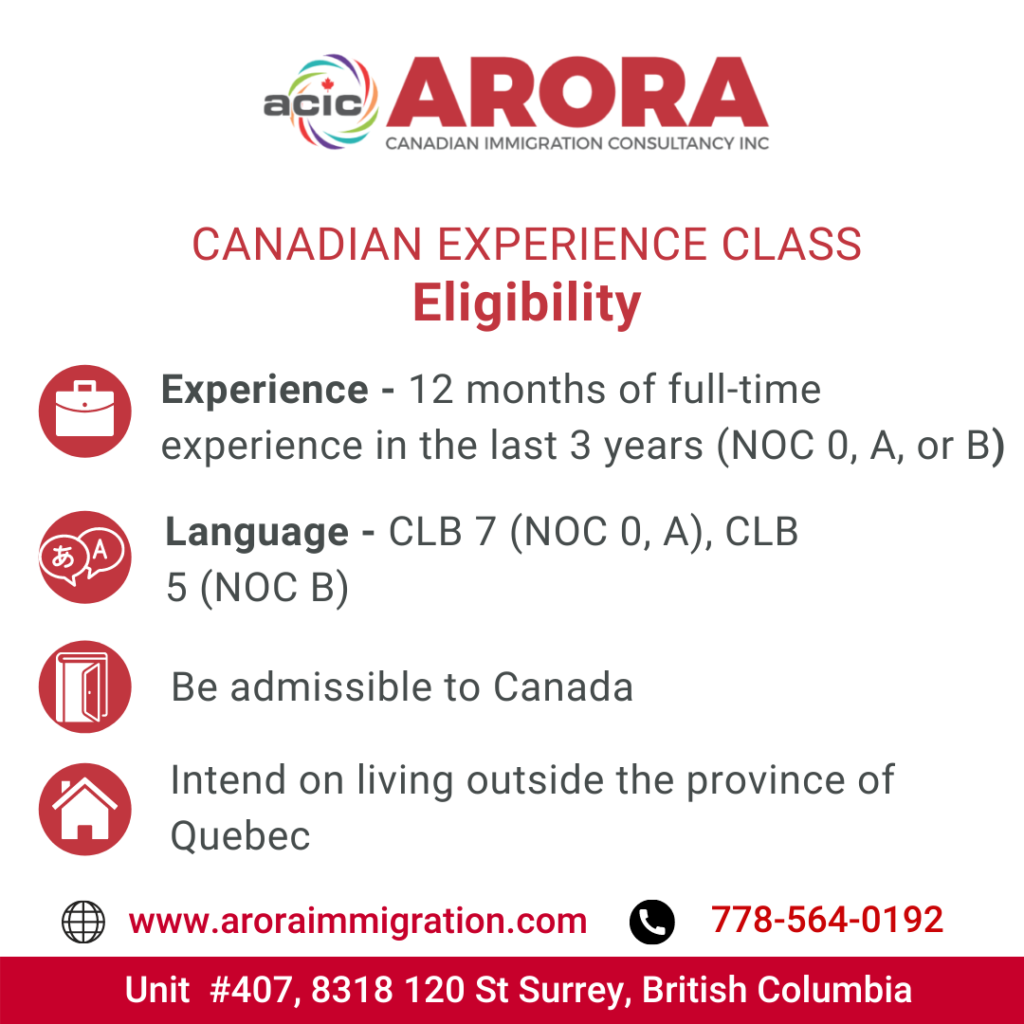What is express entry?
Express Entry is an application process by Immigration, Refugees, and Citizenship Canada (IRCC) to welcome qualified applicants to make an application for permanent residence if they are eligible.
The Express Entry pool contains candidates under the Federal Skilled Worker Class (FSWC) and Federal Skilled Trades Class (FSTC), and the Canadian Experience Class (CEC).
Candidates show a formal ‘Expression of Interest’ to settle in Canada by making an online Express Entry profile. They are given a score under the Comprehensive Ranking System (CRS) based on the individual data they provide regarding work experience, age, language ability, level of education, etc. IRCC then has draws approximately every two weeks and welcomes the applicants to apply during its Express Entry draws from the pool. If an applicant’s CRS score matches or is higher than the draw, they will receive an Invitation To Apply (ITA).
What is Canadian Experience Class (CEC?
Canadian Experience Class is 1 of the 3 federal government programs managed through Express Entry. The Canadian Experience Class (CEC) is an immigration program that permits people who have worked in Canada for a Canadian employer for one year, in the last three years to apply for permanent residency through Express Entry. This is one of the requirements, among many others to be eligible for CEC.
Eligibility Criteria – Canadian Experience Class (CEC)

CEC candidates must-
- Work Experience – Applicants must have a year of full-time (or an equal in part-time) skilled work experience in Canada within the last three years.
The experience should be obtained legally in Canada while under temporary resident status with authorization to work, such as a work permit. The work experience should be skilled work experience, meaning it should be one of the skill type 0, A, or B under the National Occupational Classification (NOC).
- Skill Level 0 – managerial jobs
- Skill Type A – professional jobs
- Skill Type B – technical jobs and skilled trades
The one year of work experience can be acquired in two different NOC codes as long as they are skilled positions, and the work experience is acquired lawfully.
What is considered full-time?
- 30 hours/week for 12 months
Can part time work experience count towards CEC?
- Yes, such as 15 hours/week for 24 months
Is self-employed or work acquired on a study permit valid under CEC?
- No, self-employed work experience or experience acquired while a full-time student is not qualified under CEC.
- Be admissible to Canada.
- Plan on living outside the province of Quebec; and
- Meet the necessary language levels required for the job for every language capacity (speaking, reading, listening, and writing).
NOC Skill level CLB Level
| NOC 0 or A | CLB 7 |
| NOC B | CLB 5 |
CEC candidates may take any of the following IRCC-approved language tests:
These tests are valid for 2 years after the results, and it must be valid on the day you apply for permanent residence.
Who is not eligible under CEC?
- refugee claimant in Canada
- anyone working without authorization
- anyone whose work experience was gained without temporary resident status in Canada
Why should you apply under CEC?
CEC can benefit you in several ways:
- Canadian Experience Class applications are handled quickly, within four months.
- Candidates under the Canadian Experience Class are not required to show proof of funds, as FSWC and FSTC candidates are.
- No education requirement for Canadian Experience Class
How to apply for CEC?
Step 1 – Obtain one year of work experience.
You need to complete your 12 months of full-time work in Canada to be eligible for CEC. The experience must be legally obtained while under temporary resident status with the authorization to work.
Step 2 – Ensure your language ability.
Complete your language test. For English, candidates may take the IELTS or CELPIP test. For French, the TEF and TCF are presently acceptable choices. Competitors with some English and French capacity can be granted extra points for capacity in both languages.
Step 3 – Create your express entry profile.
Complete this step on the IRCC website by filling out an online form and providing personal information such as work history, and language ability, etc.
Step 4 – Review your CRS score.
Although CEC does not have an education requirement, your CRS score can be improved by showing your level of education. This may increase your CRS score, ensuring that you will be above the cut-off draw, and can receive an Invitation to Apply (ITA).
Step 5 – Receive an Invitation to Apply (ITA)
Once you receive an ITA, you have 60 days to submit an application for permanent residence. Here, you must upload documents as proof such as proof of work experience, passport copies, medical exams, police certificates, use of representative form if using one, etc. A personal checklist will be given to you which includes forms and documents you need to provide with your application.
Step 6 – Submit your application.
After submitting your application with the relevant forms and detailed documentation, an Immigration officer will review the application and may contact you with additional information.
Step 7 – Get your decision.
If approved, you will receive a Confirmation of Permanent Residence document (COPR).





0 Comments